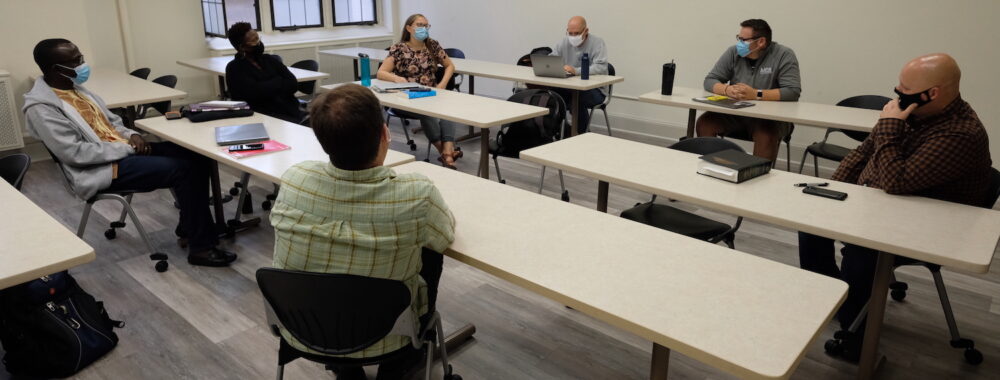The Master of Arts in Faith, Culture, and Educational Leadership (formerly the Master of Arts in Christian Education) will prepare you for ministerial vocations that intersect faith, culture, and educational leadership in ecclesial, congregational, and public settings. The degree emphasizes methods, model, and approaches that ground contemporary educational and leadership practices in traditions of critical pedagogies, emancipatory education, social justice advocacy, U.S. civil rights and global liberation movements.
Beginning in Fall 2025, our MA in Faith, Culture, and Educational Leadership will combine with our MA in Public Ministry program to provide a more unified and accessible curriculum. We will no longer be accepting applications for the MA in Faith, Culture, and Educational Leadership program beyond the Spring 2025 term.
The Master of Arts in Faith, Culture, and Educational Leadership (MAFCEL) is a 45-credit hour program. MAFCEL students can complete their degree as a residential student (primarily in-person courses on Garrett’s campus) or as a hybrid student (primarily online courses).
All MAFCEL students will take part in New Student Orientation in August of their first year (in-person or online) and in an intensive Mid-Program Evaluation Retreat in late May after their first year (in-person or online).
Foundation Courses (21-credit hours)
Concentration Electives (12-credit hours)
Formation Electives (6-credit hours)
Integrative Courses (6-credit hours)
Through coursework, experiential learning in field placements, and reflective practices with peers and faculty, students will develop integrative projects that demonstrate their capacities to offer collaborative, participatory, and emancipatory educational intervention, innovation, or experimentation that address specific needs and concerns of specific communities or contexts.
Students will keep a portfolio of all their work. It will be a hybrid portfolio that is used for processing/learning, for assessment, and for showcasing/presenting. During their last semester, students will have a portfolio presentation for Garrett’s religious education faculty, fellow degree program students, persons from their field education setting, and PhD students in the field.
All MAFCEL students must be involved in a setting of ministry or educational practice (ecclesial, congregational, non-profit, public) throughout their program. In their second semester, students will commence their practicum requirement, which may be completed in the setting in which they work or serve. The components of the practicum include practicum hours, culture circles, and regular discernment meetings with a vocational mentor.

MAFCEL students are required to be involved in a ministry or educational practice setting (ecclesial, congregational, non-profit, public) for two semesters (1.5 credit hours per semester) for approximately 5 hours a week (or approximately 130 hours total), with regular engagement with a ministry supervisor.

MAFCEL students will participate in six facilitated Culture Circles over the course of two semesters with peers in the MAFCEL degree program and other persons related to the setting for conversation and reflection of the student’s setting, ministry, and emerging MAFCEL Portfolio.
MAFCEL students can complete their degree as a residential student (primarily in-person courses on Garrett’s campus) or as a hybrid student (primarily online courses).
Students can round out their Master of Arts degree with the Master of Divinity degree. The MDiv/MA allows students to become specialists in the area of their MA degree while broadening their theological, spiritual, and leadership foundations through the Master of Divinity.
Garrett offers courses in a variety of course modalities to meet a variety of scheduling needs. Course options include in-person, online, hybrid, blended synchronous, and more. While the program is taught by faculty of Garrett, students may also take courses at Northwestern University and at any of the Association of Chicago Theological Schools (ACTS) in the Chicago metropolitan area.
Graduates of this program will be able to:
Garrett-Evangelical accepts applications from students with a minimum GPA of 2.5 in a bachelor’s degree from an accredited college or university or from an AETH-certified Bible institute. Because our primary language of instruction is English, applicants be able to show English proficiency, as evidenced by a previous degree in English or completion of either the Duolingo or Test of English as a Foreign Language test.
Applications are reviewed on a rolling basis. International student applications are due by March 1st.